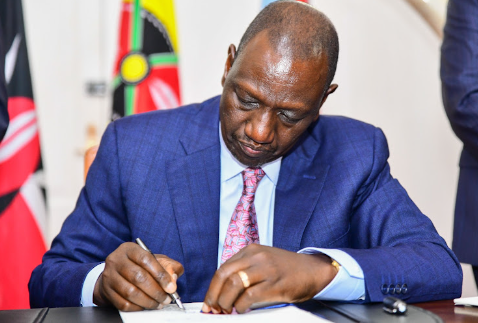National Assembly Speaker Moses Wetang’ula has instructed MPs who have concerns regarding President William Ruto’s memorandum on the withdrawn Finance Bill, 2024, to raise them through parliamentary committees. Ruto has sent the Bill back to the National Assembly, proposing the removal of all clauses.
In a recent communication, Wetang’ula has called on MPs and members of the public to share their perspectives on the management of the legislation with the Finance Committee, chaired by Molo MP Kuria Kimani.
“You are also at liberty to appear and prosecute your position before the committee on such date that it may schedule,” Wetangula said in a reply to Rarieda MP Otiende Amollo.
The MP wrote to the Speaker, expressing that the method chosen by President Ruto to reject the Bill was not anticipated by the law. He suggested that the Bill should be repealed on the same day it becomes law. The senior counsel further stated that the President’s action was delayed, and therefore, the Finance Bill automatically becomes law after 14 days from its passage at the third reading stage by MPs.
“I believe that the route of repeal on the same day that the Finance Bill would become law is one that lends itself to reason, logic and the constitution more than the alternative proposed,” Amollo said, suggesting a special sitting.
He argued that the Constitution, Standing Orders of the National Assembly and rulings of various speakers dictate against the amendment by the President.
But Wetangula, in his response, said the President’s memorandum does not make any reference to withdrawal of the Finance bill.
He dismissed Amollo’s assertion that the Finance Act, 2024 will come into force at the lapse of 14 days.
“Upon presentation of a Bill for assent, the Constitution grants the President 14 days within which to either assent to the Bill or refer it back to Parliament for reconsideration. The assertion that the Finance Bill, 2024, shall come into force after 14 days is therefore patently incorrect and misleading,” Wetangula said.
“The manner of considering reservations contained in a president’s memorandum by Parliament has been exhaustively addressed by my predecessors.”
The speaker said Parliament has previously amended bills to accommodate the President’s reservation seeking deletion of all the proposed clauses.
He cited the Central Bank bill of 2014 and the Law of Contract Bill of 2019.
The CBK law sought to facilitate improved access to government securities by Kenyans, particularly low income earners.
The law of contract sought that before a creditor pursues a guarantor in law, the creditor should first realise the assets of the principal debtor, before proceeding to the assets of the guarantor.
“At no point did either of these referred bills become law by effluxion [expiration] of time,” the speaker said.
Wetangula said MPs or house committees can only propose legislation to amend an Act of Parliament.
“The Finance Bill is not an Act of Parliament and cannot become an Act of Parliament by expiration of time,” he said.
Wetang’ula said Amollo’s proposed repeal law “is alien to the applicable legal instruments.”
He said the MP’s letter could be interpreted that he sought to negate the President’s reservations and by extension revive the Finance Bill.
“If this is the case, please be guided that you shall be required to marshal the votes of at least two-thirds of the members of the National Assembly [233] in support of your proposal,” Wetangula said.
Finance committee is expected to table its report when the House returns from a short recess on July 23.
The House will have 21 days from that sitting to consider the report.



